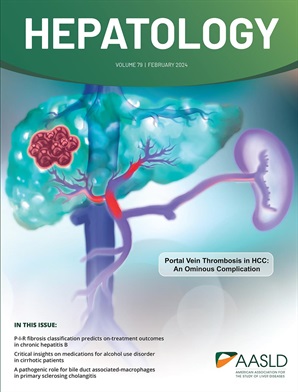Plasma FSTL-1 as a non-invasive diagnostic biomarker for patients with advanced liver fibrosis
IF 12.9
1区 医学
Q1 GASTROENTEROLOGY & HEPATOLOGY
引用次数: 0
Abstract
Objective: Reliable novel non-invasive biomarkers for the diagnosis of advanced liver fibrosis are urgently needed in clinical practice. We aimed to investigate the accuracy of plasma Follistatin-like protein 1 (FSTL-1) in the diagnosis of advanced liver fibrosis in chronic liver diseases. Design: We collected cross-sectional clinical data for a Derivation Cohort (n=86) and a Validation Cohort (n=431), totaling 517 subjects with the liver biopsy. Advanced liver fibrosis was defined by the METAVIR pathological score (F≥3). Dual cut-off values for diagnosis were explored. Results: In the Derivation Cohort, plasma FSTL-1 levels were significantly elevated in patients with advanced liver fibrosis, with an area under the receiver operating characteristic curve (AUROC) of 0.83 (95% confidence interval [CI], 0.74-0.92). In the Validation Cohort, plasma FSTL-1 maintained good diagnostic performance, with an AUROC of 0.88 (95% CI, 0.83-0.92). Plasma FSTL-1 levels were significantly associated with individual histological features of METAVIR scoring system, including interface hepatitis, lobular necrosis, and hepatocellular ballooning (血浆 FSTL-1 作为晚期肝纤维化患者的无创诊断生物标志物
目的:临床急需可靠的新型非侵入性生物标志物来诊断晚期肝纤维化。我们旨在研究血浆纤溶酶样蛋白 1(FSTL-1)诊断慢性肝病晚期肝纤维化的准确性。设计:我们收集了衍生队列(86人)和验证队列(431人)的横断面临床数据,共有517名受试者接受了肝活检。晚期肝纤维化由 METAVIR 病理评分(F≥3)定义。探讨了诊断的双重临界值。研究结果在衍生队列中,晚期肝纤维化患者的血浆 FSTL-1 水平显著升高,接收者操作特征曲线下面积 (AUROC) 为 0.83(95% 置信区间 [CI],0.74-0.92)。在验证队列中,血浆FSTL-1保持了良好的诊断性能,AUROC为0.88(95% CI,0.83-0.92)。血浆 FSTL-1 水平与 METAVIR 评分系统的个别组织学特征(包括界面性肝炎、小叶坏死和肝细胞气球化)显著相关(p<0.0001)。截断值≤0.43 ng/mL是最佳的排除阈值,灵敏度为84.62%(95%CI 76.46%-90.30%),特异度为79.51%(95%CI 74.81%-83.53%);而≥0.50 ng/mL是最佳的排除阈值,特异度为86.41%(95%CI 81.06%-90.43%),灵敏度为70.67%(95%CI 64.41%-76.23%)。结论血浆FSTL-1具有很高的诊断准确性,在识别晚期肝纤维化患者时有可能减少对肝活检的需求。
本文章由计算机程序翻译,如有差异,请以英文原文为准。
求助全文
约1分钟内获得全文
求助全文
来源期刊

Hepatology
医学-胃肠肝病学
CiteScore
27.50
自引率
3.70%
发文量
609
审稿时长
1 months
期刊介绍:
HEPATOLOGY is recognized as the leading publication in the field of liver disease. It features original, peer-reviewed articles covering various aspects of liver structure, function, and disease. The journal's distinguished Editorial Board carefully selects the best articles each month, focusing on topics including immunology, chronic hepatitis, viral hepatitis, cirrhosis, genetic and metabolic liver diseases, liver cancer, and drug metabolism.
 求助内容:
求助内容: 应助结果提醒方式:
应助结果提醒方式:


